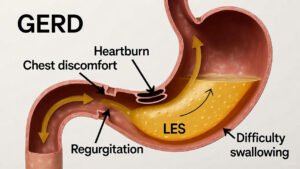Colon health is a significant concern around the world. With increasing awareness of the risks associated with colorectal diseases, early detection can prevent life-threatening conditions like colon cancer.
To reduce the risk of colon cancer, it’s essential to identify and remove colon polyps from the early stage. These growths can develop into cancer over time if they are left untreated. Understanding the importance of early detection can help you safeguard your health.
What Do You Mean by Colon Polyps?

Colon polyps are small clusters of cells forming on the lining of the colon or rectum. While many polyps are harmless, some may develop into cancer if left untreated, underscoring the importance of timely diagnosis. Detecting these growths usually involves a colonoscopy procedure, where a specialist examines the colon using a flexible camera-equipped tube. During this examination, any detected polyps can be safely removed via endoscopic polypectomy to prevent cancer progression.
Why Early Detection Matters for Colon Polyps?

Early detection of colon polyps can reduce the risk of colon cancer. Polyps often do not cause symptoms; that’s why regular screenings are essential, for those over the age of 50 or those with a family history of colorectal cancer. When polyps are found and removed early, the chances of developing colon cancer can be diminished.
With an ageing population and an increasing number of individuals at risk, national health policies advocate for regular screenings of individuals starting at age 50. Those people having a higher risk like individuals with a family history of colorectal cancer should consider earlier screenings.
How to Raise Awareness and Overcome Stigma Around Early Detection?

The main challenge in early detection is the reluctance of individuals to perform screening because of fear, embarrassment, or lack of awareness. The stigma surrounding these procedures can be eradicated with education and encouragement. Governments should raise awareness about the importance of colon health and make continued efforts to ensure that more people take advantage of early detection opportunities.
How Does Lifestyle Impact Colon Health?

Apart from early screenings, lifestyle choices can help the concerned individuals maintain colon health. A diet rich in fibre, regular physical activity, and avoiding excessive alcohol consumption and smoking can reduce the risk of developing colon polyps. However, adopting these healthy habits alongside regular screenings can significantly improve long-term colon health.
Final Conclusion
Detecting colon polyps early is one of the most effective strategies in preventing colorectal cancer. Alongside routine gastrointestinal screenings, healthy lifestyle modifications, and increased public knowledge, these efforts can save many lives. With our cutting-edge colonoscopy and polypectomy services, Crest Surgical Practice provides comprehensive care tailored to your needs.
To learn more or schedule an evaluation, please get in touch with our expert surgical team or call us at +65 6908 9800 or +65 8802 1000. Take the first step toward safeguarding your colon health today.







